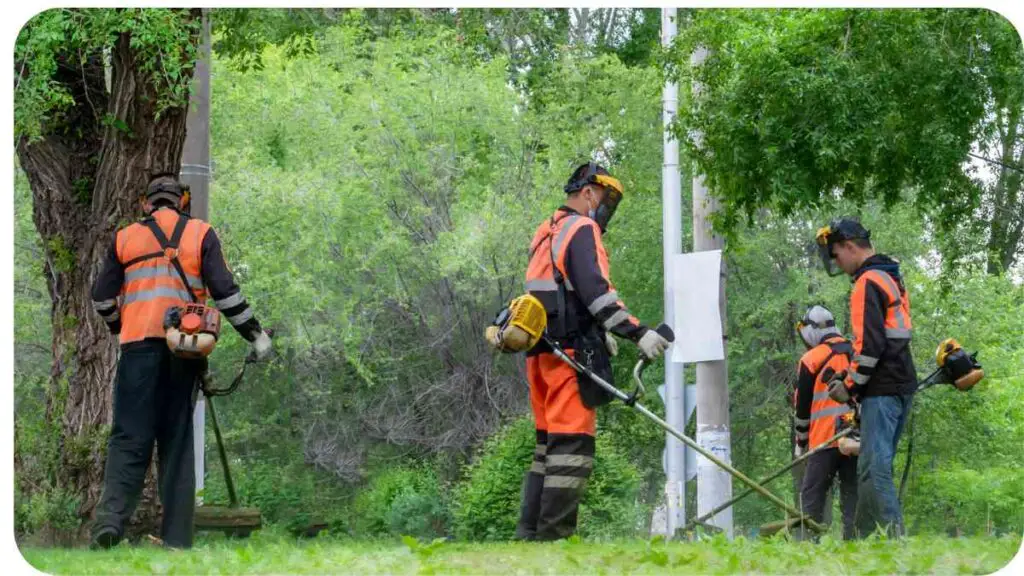Curious about the legal consequences of neglecting your lawn? In this guide, we explore the implications of not mowing your lawn and provide insights into potential fines, liens, and even foreclosure. Discover how your lawn’s condition can impact your property value, community relations, and even your freedom.
Stay informed on state-specific laws, and learn alternative lawn care methods to maintain a beautiful, law-abiding outdoor space. Let’s delve into the legal aspects of lawn care to ensure your greenery doesn’t become a legal headache.
| Takeaways |
|---|
| Neglecting to mow your lawn can have legal consequences, including fines, liens, and even foreclosure in extreme cases. |
| While the laws on lawn care neglect vary by state, it is important to maintain your lawn to avoid legal trouble. |
| Regular lawn maintenance is the best way to avoid legal trouble for not mowing your lawn. |
| Alternative lawn care methods can also help you maintain a beautiful lawn without the use of harmful chemicals or excessive water. |
| Be sure to check your local laws and regulations to stay informed about the legal implications of lawn care neglect. |
For those looking to get rid of mushrooms in their lawn, our post on Can You Get Rid of Mushrooms in the Lawn? offers practical solutions to keep your yard looking its best. Join us on our gardening journey and discover more ways to maintain a beautiful and healthy outdoor space.
Why Regular Lawn Maintenance Matters

Maintaining your lawn isn’t just a matter of aesthetics; it’s often a legal obligation. Many cities enforce ordinances requiring homeowners to keep their yards clean and trimmed. Failure to comply with these regulations can result in fines or, in extreme cases, legal consequences such as jail time.
Beyond the legal aspect, a well-maintained yard plays a pivotal role in neighborhood harmony. Neglecting yard work might lead to disgruntled neighbors, who could report you to local authorities. No one wants their grassy oasis to be the eyesore of the neighborhood, causing neighbors to spend more time fretting about your lawn than enjoying their own.
Moreover, the impact extends to property values. Prospective buyers are less likely to consider purchasing homes in areas where neighboring properties lack manicured lawns. The visual appeal of a neighborhood contributes significantly to its desirability, making it essential for homeowners to uphold a standard of lawn care that enhances the overall appeal of their community.
“Not mowing your lawn can result in hefty fines and legal consequences. Our article on getting fined for not mowing your lawn explains the legal implications of neglecting lawn care, so you can avoid legal trouble.”
Understanding the Legality of Lawn Maintenance
The decision not to mow your lawn is a personal one, but it’s essential to be aware of the legal implications that may follow. While it’s not inherently illegal to refrain from mowing, there are considerations based on location and local regulations.
In many areas, particularly within city limits, there are laws against having overgrown grass on your property. However, the consequences typically lean towards fines rather than severe penalties like jail time or property seizure. It’s crucial to understand the specific regulations in your area to make an informed decision about your lawn care responsibilities.
It’s worth noting that, while not illegal, neglecting lawn maintenance may prompt others to report your property to local authorities. The perception of your yard as a public eyesore could lead to fines or other enforcement actions. In a community, maintaining a level of care for your lawn is not just a personal choice; it also contributes to the overall aesthetics and harmony of the neighborhood.
Consequences of Neglecting Lawn Maintenance

Neglecting to mow your lawn can trigger a series of escalating consequences enforced by the city. Initially, you may receive a warning letter urging compliance with local laws and ordinances regarding lawn care.
Should you persist in neglecting your lawn, city officials may conduct a follow-up inspection of your property. If they determine that the issue persists, you could face a citation, typically amounting to $50. This citation can usually be settled either by mail or in person at City Hall. Alternatively, community service may be offered as an alternative to paying fines.
Repeated offenses within a 12-month period may incur significantly higher fines, potentially reaching up to $2,500 per day depending on the duration since the last mowing.
“Water conservation is becoming increasingly important in lawn care. Our article on having a nice lawn without watering provides tips on how to maintain a beautiful lawn without wasting water, which can help avoid legal issues related to water usage.”
Consequences of Ignoring Lawn Care for a Month
Neglecting to mow your lawn for a month can lead to various consequences, primarily driven by local regulations and enforcement measures. Here’s what could transpire:
- Fines: The most immediate consequence is the imposition of fines. The amount may vary based on your jurisdiction, but it serves as an initial financial penalty for non-compliance with lawn care regulations.
- City Council Ordinance: In response to persistent neglect, your local city council may pass an ordinance specifically targeting overgrown lawns. This could empower them to enforce stricter fines or other penalties for failing to maintain your property.
- Arrest Warrant: In extreme cases, continued non-compliance might lead to the issuance of an arrest warrant. Law enforcement officers could be dispatched to your home to address the violation, potentially resulting in arrest if the lawn remains unmowed.
- Community Impact: Beyond personal consequences, neglecting lawn care can have broader community repercussions. If neighbors observe the decline in property values or the overall aesthetics of the neighborhood, it may lead to a collective call for stricter enforcement measures.
The increasing severity of consequences emphasizes the importance of timely lawn maintenance. It not only avoids individual penalties but contributes to the overall well-being and harmony of the community.
Legality of Neglecting Lawn Maintenance: Civil Offense and Consequences
While not mowing your lawn might not be deemed criminal, it can still be considered a civil offense in many jurisdictions. The consequences for neglecting lawn care typically involve fines, but the enforcement process may escalate if these fines are left unpaid.
Here’s what you should know about the legal implications:
- Civil Offense: Neglecting to cut your grass is generally categorized as a civil offense. This means you may face financial penalties, but it doesn’t carry the same weight as a criminal offense.
- Fines and Liens: If you receive fines for not maintaining your lawn and fail to pay them, authorities may escalate their actions. One common consequence is the placement of a lien on your property. This serves as a legal claim against your home, and if the fines remain unpaid, the property could be put up for sale to cover the outstanding amounts.
- Criminal Consideration during Eviction: The situation could take a criminal turn if you are being evicted from the property, and there is evidence of intentional damage to prevent others from living there afterward. In such cases, criminal charges might be pursued due to actions that go beyond neglecting lawn care and involve intentional harm to the property.
Understanding the legal categorization and potential consequences highlights the importance of addressing lawn care responsibilities promptly to avoid escalating penalties and legal troubles.
Arrests for Neglecting Lawn Care: Understanding the Possibilities
While it’s not a common occurrence, people can be arrested for not cutting their grass, especially if repeated warnings and fines have been ineffective in prompting compliance. Here’s a closer look at the potential consequences:
- Inspections and Fines: Initially, if your lawn is not maintained, you may receive warnings and fines from the city. Authorities may conduct inspections to ensure compliance with local laws regarding lawn care.
- Escalation to Law Enforcement: If repeated fines and warnings do not lead to corrective actions, authorities may escalate the matter by involving law enforcement. The police could be called to address the violation and enforce compliance.
- Cost of Going to Jail: The cost of going to jail for not cutting your grass can vary based on your location. Some states and municipalities impose specific fines for maintaining an unkempt property. For instance, in Chicago, the fine for an unkempt yard is $1000. Additionally, charges for contempt of court may be incurred if there was a court order mandating lawn maintenance.
Understanding the potential financial penalties and legal consequences emphasizes the importance of addressing lawn care responsibilities promptly. While arrests are not common, persistent non-compliance can lead to increasing legal troubles and financial burdens.
“Protecting your lawn mower is just as important as maintaining your lawn. Learn more about lawn mower insurance in our article on getting insurance on a lawn mower to ensure that you are fully covered.”
Extreme Case: Jail Sentence for Neglected Lawn

While it’s rare for individuals to face jail time solely for neglecting their lawns, extreme cases do exist, highlighting the gravity of consequences in specific situations. One noteworthy example occurred in Missouri:
Case Overview:
In a recent incident, a Missouri man received a two-year jail sentence due to the extreme neglect of his lawn, reaching a point where he couldn’t open his garage door. The severity of the situation was compounded by the individual’s criminal history, including unpaid child support and abusive behavior towards two different women, one of whom was pregnant.
Faced with these circumstances, a judge presented the man with three options to address the issue. He could either pay the fines immediately, utilize an ankle bracelet monitoring system while staying at home until the fines were settled, or opt for a direct two-year jail sentence for contempt of court. The individual, citing disability due to alcoholism and an inability to work, refused all three options.
Neighbor Complaints and City Action: Impact of Overgrown Lawns
Neglecting to mow your lawn can lead to complaints from neighbors, potentially triggering a series of actions by the city. Here’s how the process typically unfolds:
- Neighbor Complaints: If your grass grows too long, neighbors may express their concerns to the city, citing your neglected lawn as a potential eyesore.
- City Inspection: In response to complaints, the city may send someone to inspect your property. The inspection aims to assess whether your lawn complies with local standards and regulations.
- Enforcement Measures: If your property is found to be in violation of city standards, the authorities may issue directives for more frequent mowing or take further action. The severity of these measures often depends on the perceived level of neglect.
- Forced Compliance: In extreme cases, you might be compelled to mow your lawn more frequently to meet the city’s standards. Failure to comply could result in escalating consequences, such as fines or legal action.
Lawn Care During Rainy Weather: Legal Considerations
While you have the legal choice not to mow your lawn, there are other legal aspects to consider, especially during rainy weather:
- Property Trespassing: Neglecting to mow your lawn due to rain doesn’t, on its own, violate the law. However, if the overgrown grass starts encroaching onto neighboring properties, it could be considered trespassing. Property boundaries should be respected even in the context of lawn care decisions.
- Access for Emergency Vehicles: Another legal consideration involves maintaining accessible roads for emergency vehicles. If the lack of lawn maintenance hinders the passage of emergency vehicles, it may lead to legal consequences. Laws may vary, but failing to provide adequate access could result in fines or even jail time, depending on the duration of neglect.
- Community Aesthetics: While not necessarily a legal requirement, maintaining your lawn contributes to community aesthetics. Overgrown lawns can impact the visual appeal of the neighborhood and potentially lead to complaints from neighbors.
“Did you know that parking on your lawn could result in a ticket or legal consequences? Our article on getting a ticket for parking on your lawn explains the legal implications of lawn parking and how to avoid getting in trouble with the law.”
Consequences of Unpaid Fines: Escalating Legal Actions
Refusing to pay fines for not mowing your lawn can lead to a series of escalating legal actions. Here’s how the process typically unfolds:
- 60-Day Notice: If you don’t pay the fine within the stipulated time frame, typically 60 days, your property will receive a notice from the city’s code enforcement office. This notice serves as a warning of impending consequences for non-compliance.
- Fine Increase and Property Tax Bill: The fine amount may increase, and if left unpaid, it could be added to your property tax bill. This step is taken to ensure that the outstanding fines are addressed and do not go unresolved.
- Court Appearance: If you still refuse to pay the fine after it becomes part of your property tax bill, code enforcement officers may initiate legal proceedings. You could be summoned to appear in front of a judge to address the non-compliance.
- Potential Jail Time: In extreme cases, if found guilty of contempt of court for refusing to address the fines, a judge may order jail time as a consequence. This serves as a last resort to enforce compliance with legal obligations.
Conclusion
In conclusion, the decision to neglect lawn care can lead to a range of legal consequences, from fines to potential jail time, depending on the severity of the violation and local regulations. The laws surrounding lawn maintenance are in place to ensure community aesthetics, property values, and adherence to established standards.
To avoid legal trouble related to lawn care, it’s crucial to stay informed about local laws and regulations. Regular and timely maintenance of your lawn not only contributes to the overall well-being of the community but also helps in preventing financial penalties and legal actions.
So, whether life gets busy or other priorities take precedence, remember the legal implications of an unkempt lawn. Consider involving someone else to ensure your yard remains well-maintained, avoiding potential legal troubles and fostering a positive relationship with your community and local authorities.
“Chemical-free lawn care is not only beneficial for the environment, but it can also help you avoid legal trouble. Check out our article on having a nice lawn without chemicals for tips on maintaining a beautiful lawn without harmful chemicals.”
Further Reading
For more information on the legal implications of not mowing your lawn, check out these resources:
Fines, Liens, Foreclosure: What Happens If You Refuse to Mow Your Lawn?: This article explains the potential legal consequences of neglecting lawn care, including fines, liens, and even foreclosure.
Is it Illegal to Not Mow Your Lawn?: This resource provides an overview of the legal implications of not mowing your lawn, including potential fines and legal action.
Can You Be Fined for Not Mowing Your Lawn?: This article explains the possible fines and legal consequences of not mowing your lawn, as well as some tips for avoiding legal trouble.
FAQs
Can you get fined for not mowing your lawn?
Yes, not mowing your lawn can result in fines and legal consequences. Depending on where you live, you may be subject to fines or even liens and foreclosure if you neglect your lawn care.
Is it illegal to not mow your lawn?
While the legality of not mowing your lawn can vary depending on where you live, neglecting lawn care can result in fines and legal action in many places.
How often should you mow your lawn to avoid legal trouble?
The frequency of lawn mowing needed to avoid legal trouble can vary depending on where you live and local regulations. However, in general, it’s best to keep your lawn mowed regularly to avoid issues with your neighbors or local government.
What are some alternatives to mowing your lawn?
If you’re looking for alternatives to mowing your lawn, there are a few options to consider. Some people choose to use a natural lawn care approach, which involves using natural methods to promote lawn health and growth. Others opt for lawn alternatives, like gravel or mulch, which require less maintenance than traditional grass lawns.
How can you avoid legal trouble related to lawn care?
To avoid legal trouble related to lawn care, it’s important to keep your lawn well-maintained and follow any local regulations related to lawn care. This may involve mowing your lawn regularly, keeping your lawn free of weeds and debris, and ensuring that your lawn is not causing any hazards or nuisances for your neighbors.

For 15 years, Hellen James has worked in the gardening industry as an expert and landscape designer. During her career, she has worked for a variety of businesses that specialize in landscaping and gardening from small firms to large corporations.

